Treating mold allergies is essential for maintaining good health and avoiding severe reactions. With effective treatment, you can reduce symptoms like sneezing, congestion, and discomfort, significantly improving your overall well-being.
At Penn Medicine Becker ENT & Allergy, we provide expert guidance tailored to your needs. This article offers an in-depth look at mold allergies, including how to identify if you’re allergic, what medications can help relieve symptoms, and the best ways to manage and treat mold allergies. Get in touch for professional guidance from our expert allergists.
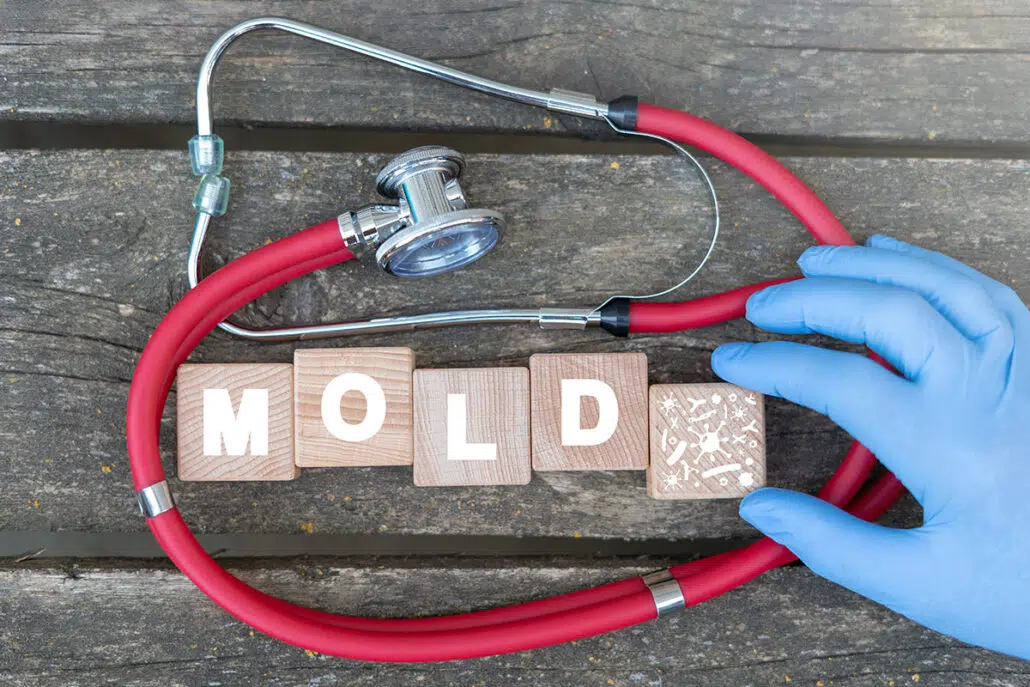
For more details about treatments like prescription medications and immunotherapy for mold allergies, take a look at Our Mold Allergy Treatments page.
Quick Tips for Handling Mold Allergies
- Recognize mold allergy symptoms by noticing sneezing, stuffiness, and itching in damp places.
- Confirm your allergy through skin or blood tests.
- Take over-the-counter treatments such as antihistamines or nasal sprays.
- Limit mold exposure by reducing indoor humidity and using air filters.
- Seek professional help if simple remedies do not improve your symptoms.
What Are Mold Allergies and How Do They Affect You?
Mold allergies occur when the immune system overreacts to mold spores, leading to symptoms like nasal congestion, runny nose, and itchy skin. These spores are tiny particles released by molds commonly found both indoors and outdoors.
Indoor molds thrive in damp areas like bathrooms or spaces with water damage, while outdoor molds are often found on decaying plants or in moist soil. Factors such as water leaks or high humidity can increase mold levels in homes, making allergies a persistent issue. For some, mold allergies may worsen asthma symptoms, potentially causing allergic asthma or severe asthma attacks.
Recognizing Mold Allergy Symptoms
If you often find yourself with nasal congestion, runny nose, sneezing, coughing, or dealing with itchy nose and eyes after spending time in damp spaces like basements or bathrooms, you might have a mold allergy.
Pay attention to when your symptoms flare up—mold commonly thrives in humid spots and on rotting leaves outdoors. Keeping an eye on your symptoms and noting where you feel them most can help you figure out if mold is the culprit.
Confirming Your Mold Allergy
To know for sure, ask your doctor about a skin prick test, where a small amount of mold spores is placed on your skin to check for a reaction, such as itching or a rash.
You could also get a blood test that measures mold-specific IgE antibodies. Elevated levels of these antibodies often mean you’re allergic. Getting the right test helps you understand your allergy better and plan how to keep those annoying symptoms under control.
What To Take For Mold Allergies
Medications for mold allergies include nasal corticosteroids, antihistamines, and allergy shots. Dealing with these allergies can be challenging, but understanding how to control symptoms effectively can make a significant difference. While several options are available, it’s usually best to begin with simple, over-the-counter solutions that offer quick relief.
Over-the-Counter Solutions
For immediate relief from the symptoms of mold allergies, consider over-the-counter (OTC) options such as antihistamines and nasal corticosteroids. These medications can help reduce symptoms like nasal congestion, runny nose, and sneezing by targeting the body’s allergic response.
Antihistamines
Antihistamines, a very common type of allergy medication, can play a crucial role in managing the symptoms of mold allergies. These medications work by blocking the action of histamine, an inflammatory chemical that the immune system releases during an allergic response to foreign invaders such as mold spores.
Histamine is responsible for many of the irritating nasal symptoms associated with allergies, such as a runny nose, nasal congestion, and sneezing. By inhibiting the action of histamine, antihistamines can help to alleviate these symptoms, providing relief for individuals suffering from mold allergies.
Nasal Corticosteroids
Nasal corticosteroids are another type of medication. These medicines are specifically designed to combat the inflammation in the nasal passages often caused by exposure to mold spores. These medications work by reducing the immune response in the nasal passages, alleviating irritating nasal symptoms such as nasal congestion, runny nose, and nasal dryness.
Nasal corticosteroids, which can be administered through a nasal lavage or as a nasal spray, are particularly effective for individuals with severe or persistent mold allergy symptoms. These medications are often recommended by allergy specialists for those who have a history of allergies, particularly mold allergies.
Looking for Advanced Treatment Options for Mold Allergies?
OTC medications might not be sufficient for everyone. If your symptoms persist or significantly affect your daily life, contact Penn Medicine Becker ENT & Allergy for advanced treatment options.
How To Treat Mold Allergies
The treatments for mold exposure include avoiding mold and reducing humidity. These are a variety of strategies, including wearing a dust mask, reducing humidity in the home, and filtering the air.
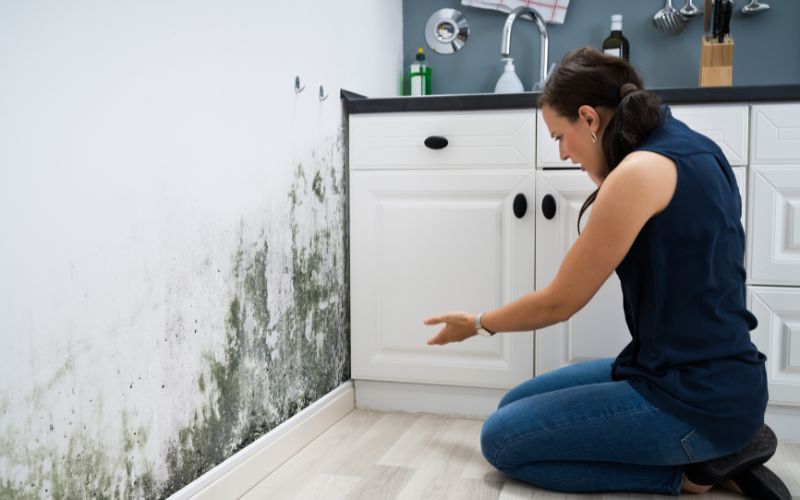
Avoidance of Exposure to Mold
One of the most effective ways to manage mold allergies is to avoid exposure to mold spores. This can be done by regularly cleaning areas where mold is likely to grow, such as garbage cans and refrigerator drip pans, and by avoiding outdoor activities during times when mold counts are high.
Mold spore counts are highest on foggy, humid, damp, or rainy nights.
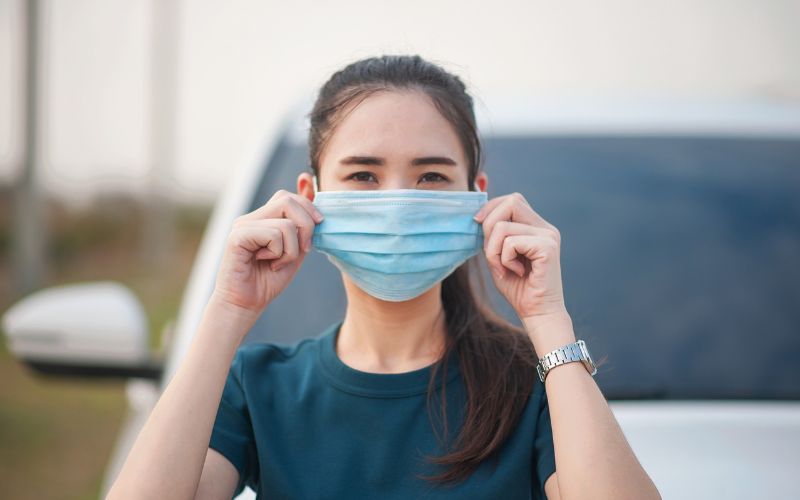
Use A Dust Mask
Wearing a dust mask over your nose and mouth can serve as a crucial protective measure to prevent the inhalation of mold spores, especially when engaging in outdoor activities where mold exposure is likely.
Activities such as raking leaves, mowing the lawn, or working around compost can stir up airborne mold spores, increasing the risk of allergic reactions. If you’re dealing with visible mold or a high mold spore count indoors, a dust mask can be beneficial.
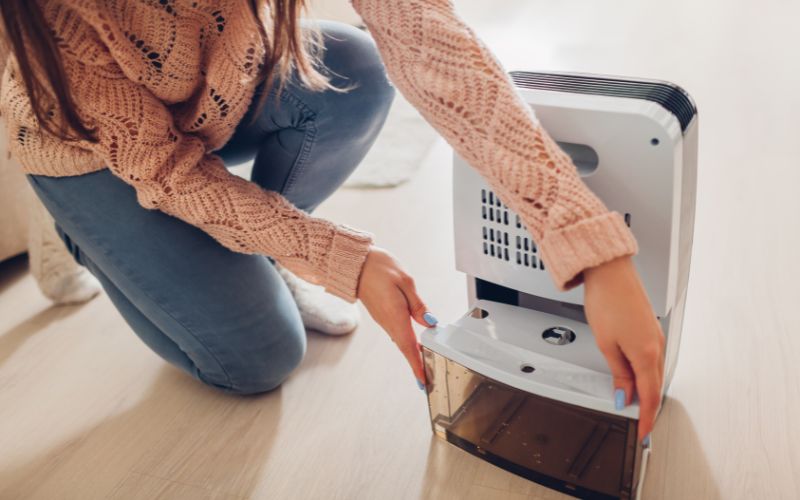
Reduce Humidity in your Home
Maintaining an indoor humidity level below 50% is very helpful in preventing the growth of various types of mold, including common molds like black mold. This can be accomplished by using an air conditioner, dehumidifier, or exhaust fan, or by opening a window to reduce moisture and humidity in bathrooms or other rooms in the home.
Water seepage, plumbing leaks, or flood damage can create damp environments that are conducive to mold growth. Using a moisture meter can help you monitor humidity levels and detect any potential issues early.
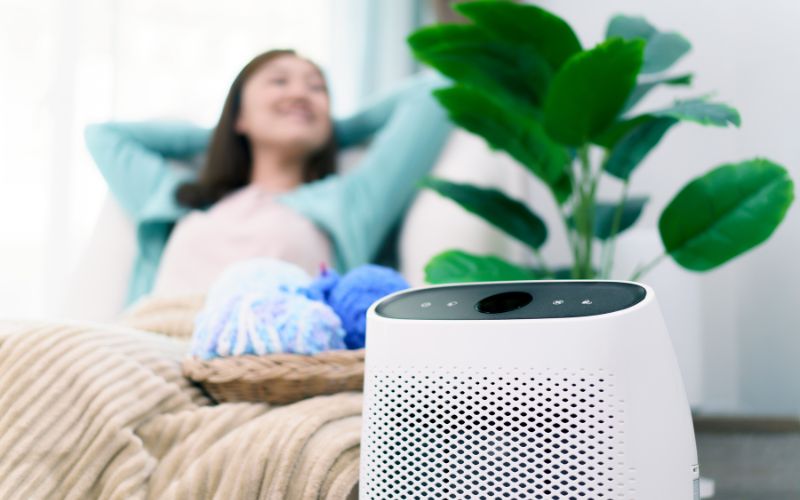
Filter The Air
Air purifiers can play a significant role in mitigating the effects of mold allergies by removing mold spores from the air. These airborne mold spores, which can be released by various types of mold, including common molds like black mold, can trigger mold allergy symptoms upon exposure.
Choosing an air purifier with a high-efficiency particulate air (HEPA) filter is crucial as these filters can capture the tiniest particles, including mold spores.
Strategies for Mold Avoidance: Indoors and Outdoors
Avoiding mold exposure is crucial for those with mold allergies. Here are practical tips to minimize exposure and manage symptoms effectively:
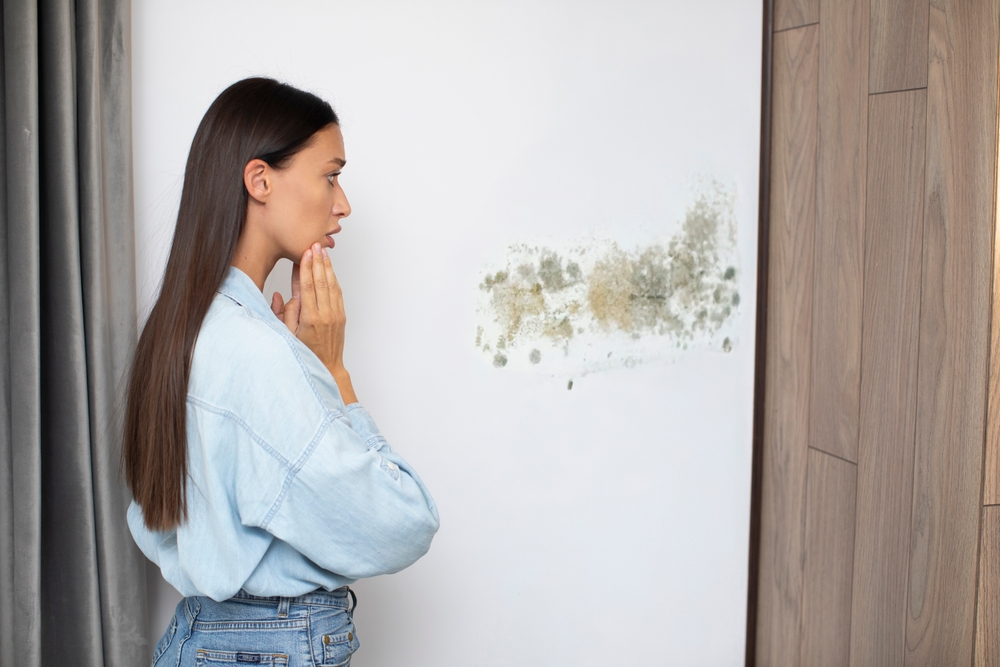
Indoors: Keep humidity levels below 50% using dehumidifiers or air conditioners. Regularly inspect and clean air filters, ducts, and areas prone to moisture, such as bathrooms and kitchens. Fix leaks promptly to prevent mold growth.
Outdoors: Limit outdoor activities during high mold spore counts, typically on damp or humid days. Wearing a mask while gardening or doing yard work can also help reduce exposure.
If Nothing Works, Get Immunotherapy
If nothing else is helping your mold allergy symptoms, immunotherapy might be the solution.
It’s a long-term treatment that can actually help your body become less sensitive to mold over time. How? You get small, regular doses of mold allergens—kind of like training your immune system to stop overreacting. This process is called allergy shots or allergen immunotherapy, and for many people, it leads to fewer symptoms and a better quality of life.
If you’ve already tried medications and controlling your environment but you’re still sneezing, congested, or feeling miserable, this could be the next step. At Penn Medicine Becker ENT & Allergy, we offer personalized immunotherapy plans designed to fit your specific needs.
Mold Allergies and Their Link to Allergic Asthma
If you have mold allergies, you might notice sneezing, stuffy nose, or itchy eyes when exposed to mold. But for some people, especially those with asthma, mold can cause more serious problems. Breathing in mold spores can irritate your airways, leading to coughing, wheezing, and trouble breathing—this is called allergic asthma. It’s a type of asthma triggered by allergens like mold and can sometimes lead to severe asthma attacks.
It could be time to talk to a specialist. At Penn Medicine Becker ENT & Allergy, we’re here to help with management and treatment like medications or allergy shots.
Treat Mold Allergy with a Penn Medicine Specialist
If you’re experiencing persistent or severe symptoms of mold allergies, such as nasal congestion, runny or stuffy nose, sneezing, irritated eyes, coughing, wheezing, and an itchy throat, it may be time to see an allergist. These symptoms can be a reaction to various types of mold, including common molds like black mold, which can be found in damp environments both indoors and outdoors.
An allergist can perform tests to confirm whether you have a mold allergy and can provide personalized treatment options, which may include medications or immunotherapy (a series of allergy shots). If you’re looking for an allergy clinic in Philadelphia, NJ, Penn Medicine Becker ENT & Allergy also serves the areas of Glenside, Elkins Park, Bala Cynwid, Ardmore, and Havertown. Contact us today and schedule a consultation with our team of experienced professionals, or reach out to our Walnut Street location.

